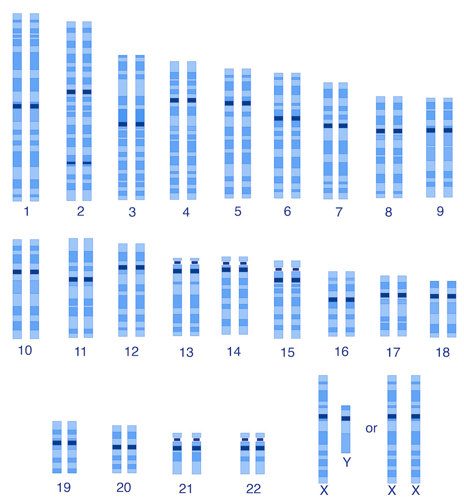
What are my chances of being a carrier, given my brother has Fragile X?
June 21, 2017

- Related Topics:
- X linked inheritance,
- Genetic conditions
A curious adult from India asks:
“I have a brother who is suffering from Fragile X syndrome (full mutation). I wanted to know, given that I am male, what my chances of being a carrier are. How will the future generations of my family be affected by this?”
Fragile X is a tricky genetic disease. Given that you don’t have the disease you are either not a carrier or you are a carrier of a premutation.
In the first case, your kids aren’t at any risk for getting Fragile X. You are not a carrier and so you can’t pass it on to them.
In the second case, your daughters are at a very low risk of having Fragile X, while your sons are at no risk. However, in this second case, your daughter’s sons have a higher risk of getting Fragile X.
As you can see, Fragile X is really complicated! In fact, because it is so complicated, we definitely recommend seeing a genetics provider for more tailored information about your family’s situation.
Fragile X Came from Your Mom
Because your brother has Fragile X, we know that he almost certainly got it from your mom. This is because Fragile X is caused by mutation in a gene on the X chromosome. And biological males get their X from their moms.

All the instructions for making you are found on your 23 pairs of chromosomes. You get one from each pair from mom and one from dad.
So you got one of your chromosome 1’s from mom and the other from dad. The same is true for the rest of your chromosomes.
The first 22 pairs of chromosomes are the same in both boys and girls. For the 23rd pair, if a person has two X chromosomes they are usually born female, and if a person has an X and a Y chromosome, they are usually born male.
Because mom has two X’s, she can only give an X to her kids. So both boys and girls get one X from mom.
Dad is different though. If he passes an X, the child will biologically be female and if he passes a Y, the child will be biologically male. This is why your biological sex comes from dad.


This isn’t just important for gender, because Fragile X is caused by mutations in a gene on the X chromosome (that is where the “X” comes from). Your brother has Fragile X, which means it came from your mom because he got his Y from dad. Mom is a carrier which means she has the chromosome that can lead to the disease but does not have the disease because of her other X.
Now we know your mom is a carrier, but we don’t know what kind of carrier she is. There are two kinds of carriers with Fragile X — premutation and full.
If your mother has a full mutation, then all of her sons who inherit the “Fragile X” X chromosome will have Fragile X. Each son would have a 50% chance for getting this X.
If this describes your mother, then you know you didn't inherit that X. We know that you don’t have the full mutation, because if you did you would have Fragile X. And since you didn't inherit the full mutation, you could not pass it along to a child.
If instead your mother is a premutation carrier, then it is possible for her to have a son who inherits her premutation but does NOT have Fragile X. He would have the premutation as well.
This might be you. A premutation usually won’t cause problems for the person with it. But it can sometimes turn into a full mutation in the next generation.
You Might Have a Premutation
A premutation means that a person does not have an X chromosome which will cause the disease, but their children or even their grandchildren can end up getting one that does.
If you have a premutation, we know your sons are very unlikely to get it from you. They get your Y and not your X. Your daughters are a different matter though.
You will pass on your premutation to all of your daughters. But most likely the premutation will stay that way and not turn into a full mutation.
This is because for some reason, premutations don’t usually turn into full blown mutations unless they are passed from mother to children. Since it is coming from dad, it will probably stay a premutation.
But even if the daughters do end up with a full mutation, it is likely they would show fewer symptoms than males who have Fragile X. This is because they would inherit a second copy of the X chromosome from their mother that can compensate for the “Fragile X” one they got from dad. (They would be similar to your mother, a carrier.)
Your Daughters’ Children
If a daughter ends up with the full blown mutation, then each of her sons has a 50% chance for ending up with Fragile X. (Each daughter has a 50% chance too but remember that if they have any symptoms, they would be less severe.)
It gets a little trickier if a daughter has a premutation because now there is a higher chance it can transform into a form that can cause Fragile X. Not 100% but significant. (We can’t give exact numbers because it depends on the specific premutation a person has.)
The same 50% chance I talked about earlier applies to the premutation. But even if her son (your grandson) gets it, he may or may not end up with Fragile X. It depends on whether it happens to change into the full mutation or not.
If it does, then he will have Fragile X. And if it stays a premutation, then he will be a premutation carrier. And the whole thing will repeat in the next generation.
Any daughters that your daughters with the premutation have will have a fifty percent chance of being a carrier as well. If they are a carrier, the risks for them will be the same as their mothers.


How a Premutation Can Become a Full Mutation in Future Generations
To understand premutations, we need to dig a bit deeper into what a chromosome is and how it works.
The instructions found in chromosomes are written in those famous four DNA letters — A, T, C, and G. This simple 4 letter alphabet explains a lot of who you are.
There is a spot on the X chromosome where three letters, CGG, are repeated many times. Fragile X happens when there are too many of these repeats.
Most people have under 45 repeats, and these people both do not have Fragile X and do not have a chance of having children with Fragile X. But when a person has over 200 CGG repeats, then they are considered to have the full mutation and if they are a male, then they have Fragile X.
People have a premutation when they have between 45 and 200 CGG repeats. When there are this many repeats, our cells often have trouble copying this part of the DNA and can make a mistake, adding copies. Once the number gets to 200 or higher, then it can cause Fragile X.
This is how a premutation can become a full mutation. The cell messes up and adds extra CGG repeats.

Author: Stephanie Bivona
When this answer was published in 2017, Stephanie was a student in the Stanford MS Program in Human Genetics and Genetic Counseling. Stephanie wrote this answer while participating in the Stanford at The Tech program.
 Skip Navigation
Skip Navigation
